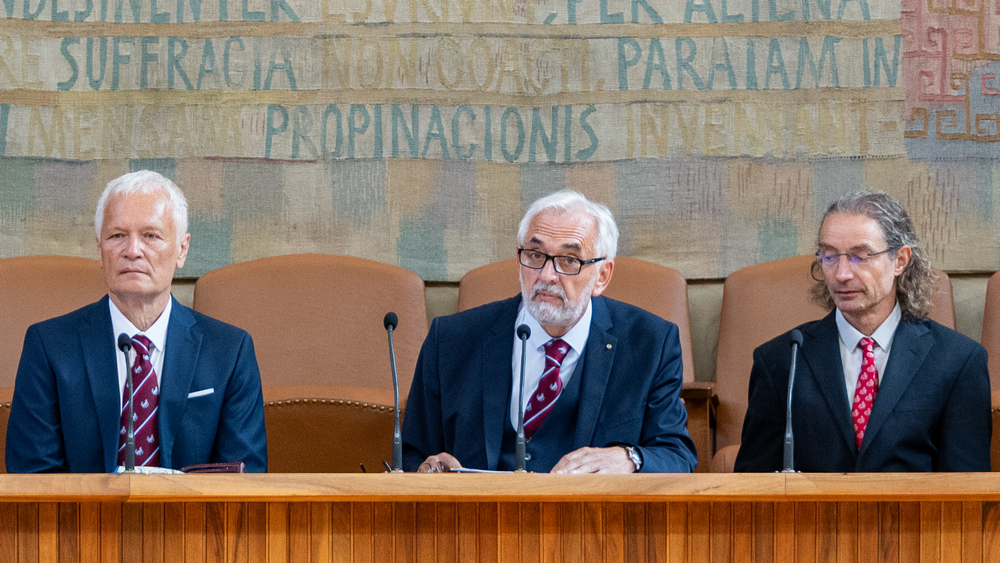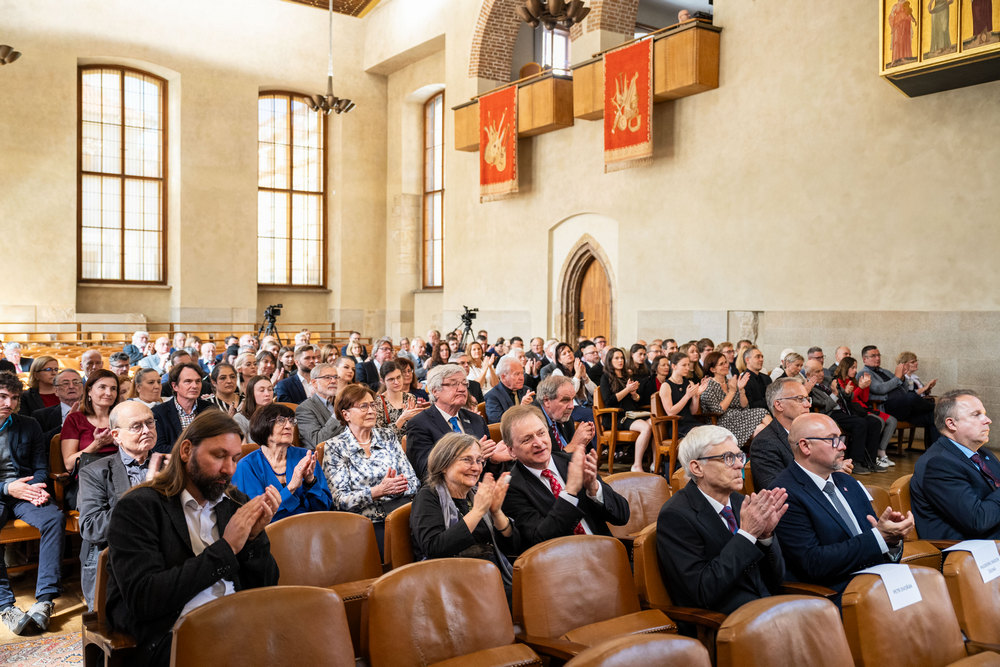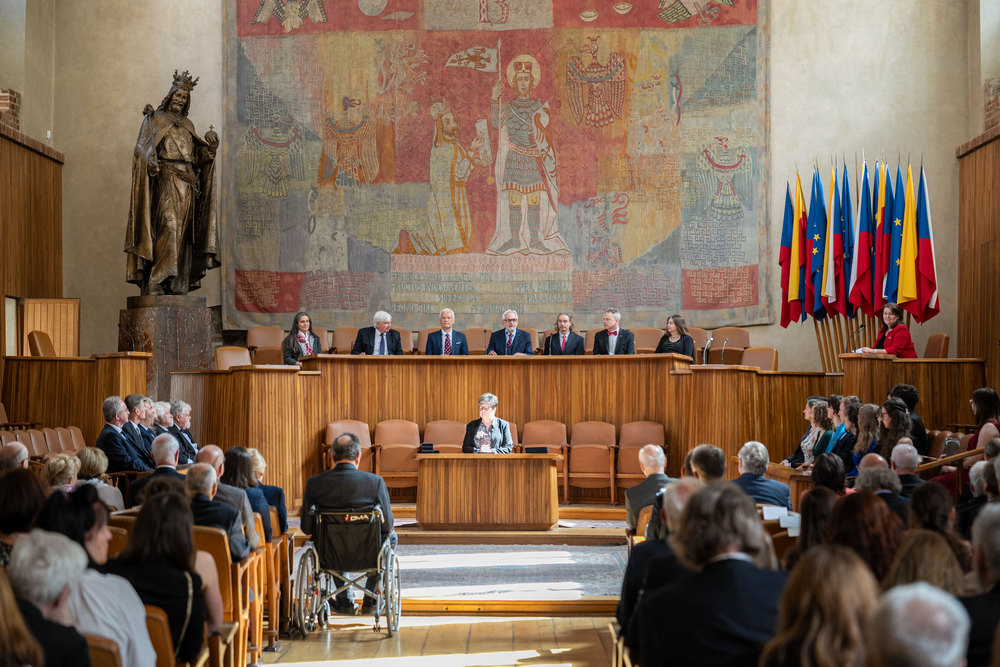21.05.2024
Speech by Libor Grubhoffer at the XXXth General Assembly of the Learned Society
"In addition to the highly technical topics of contemporary science and education, it is a vital role of the Learned Society to protect democracy and freedom in our country, to speak out in their defence at any hint of their restriction," said Libor Grubhoffer, who has served as President of the Learned Society for the last two years, in his speech at the XXXth General Assembly of the Learned Society.

Photo by Tomáš Rubín, MFF UK
Translated from Czech
Karolinum, 20 May 2024
Ladies and gentlemen,
At this year's General Assembly of the Learned Society of the Czech Republic, we are commemorating the 30th anniversary of its foundation. Thirty years ago, these days and weeks culminated the efforts to renew the learned society in our country.
Czech science lost its freely elected scientific representation in 1952, as represented by the members of the Royal Bohemian Society of Sciences, founded in 1784, or the members of the Czech Academy for Sciences, Literature and Arts, established in 1890 at the instigation of the enlightened patron Josef Hlávka. It was only after the fall of communism in our country in November 1989 and the re-establishment of a democratic state of free citizens that it was possible to start thinking about establishing a learned society.
The re-establishment of the Learned Society was preceded by the establishment of the Foundation of the Learned Society of the Czech Republic; this was the initiative of two dozen representatives of Czech science, led by Professors Otto Wichterle, the last President of the Czechoslovak Academy of Sciences, and Rudolf Zahradník, the first President of the Academy of Sciences of the Czech Republic. At the Foundation's instigation, a gathering of representatives of the Czech intelligentsia gathered here in the Karolinum on 10 May 1994; a total of 36 personalities of Czech science signed the Declaration of the Learned Society of the Czech Republic with reference to the traditions of the Royal Bohemian Society of Sciences. The expression of social and political support for the revived Learned Society was the reception of its founding members by the President of the Republic, Václav Havel, on 25 May 1994. The official establishment of the Learned Society of the Czech Republic took place after adopting the Statutes of the Learned Society of the Czech Republic on 23 June 1994; Professor Rudolf Zahradník became the first chairman. The reinforcement of the social importance of the Learned Society was given by the declared support of the Czech Academy of Sciences (CAS) in the 2005 amendment to the Law on the CAS.
The mission and main goal of the Learned Society of the Czech Republic are to support the free cultivation of science and the dissemination of scientific knowledge and education not only in the professional community but also in the general public.
The emphasis has traditionally been on a multidisciplinary approach ranging from mathematics and natural sciences to the humanities and social sciences, emphasising the world's complexities. This legacy of the tradition of the Royal Czech Society of Sciences, the Czech Academy of Sciences and Arts and the founders of the Learned Society has been closely guarded throughout, as has its close interconnection with social events. In addition to the highly technical topics of contemporary science and education, it is a vital role of the Learned Society to protect democracy and freedom in our country and to speak out in their defence at any hint of their restriction.
I cannot forgive myself for not recalling the words of Professor Rudolf Zahradník: "A learned society that was not prepared to draw sustained attention to the dangers to democracy and human society might be learned, but it would not be enlightened."
Humanity is currently facing problems in the global world; these are reflected in the complex geopolitical situation in the risky regions of our planet. The former political polarisation of the world during the Cold War, after three decades of alternately successful efforts to ensure the long-term sustainability of conflict-free world order, burst into flames two years ago in the unprecedented aggression of the Russian tyrant in Ukraine and last October in the form of the terrorist attack on Israel by the Palestinian Hamas. All this in a situation where the world has barely had time to recover from the COVID-19 coronavirus pandemic.
The barbaric actions of the Russian tyrant in Ukraine are despicable, and the brave struggle of the Ukrainian people is, for all intents and purposes, hugely exhausting. What happens next? Putin is determined to conquer Ukraine even at the cost of a burnt country, moreover with the aim of exterminating the Ukrainian people. The community of democratic nations of the civilised world must tell Putin the obvious - enough! Russia's evil empire must not prevail; there is no acceptable compromise for negotiating with a tyrant!
The situation in the Middle East following the Palestinian Hamas terrorist attack on Israel in October has also not yet been resolved. On the contrary, Israel's originally intended lightning operation to destroy the Hamas network and free the Israeli hostages has proved an impossible task in the short term. Hamas' vast underground network is a fortress, only a small part of which has been exposed and destroyed. The immense hardship of Palestinian civilians is causing a terrible humanitarian crisis in the Gaza Strip. The main evil in both war conflicts is the hardship of large numbers of innocent civilians in Ukraine and also of Palestinians in the Gaza Strip. This is the result so far of these two military conflicts, which are also polarising the world. For Ukraine, the democratic countries of the civilised world are looking for a way to challenge Putin without becoming direct participants in military operations. Israel's just struggle against terrorist Hamas and for the liberation of their hostages is about supporting democratic Israel in its fight against Palestinian terrorists, whose aim is to destroy the Israeli state. However, the situation is greatly complicated by the political division within Israel itself.
In times of war, innocent people die and suffer unjustly, but so do science, art, education and culture. The old Roman proverb says: "Inter Arma silent Musae". The damage is immeasurable for science and education in its entire breadth, from mathematics and natural and technical sciences to the humanities and social sciences. Let us, therefore, wish that the democratic countries of the civilised world manage to pull themselves together sufficiently so that the Russian tyrant withdraws for good from the illegally occupied and suffering Ukraine, starts paying war reparations for the reconstruction of the devastated Ukraine, and finally answers for the war crimes committed in Ukraine before a war court. Resolving the age-old problem between the Israelis and the Palestinians seems, by the very nature of its "biblical history", to be virtually impossible. A never-ending task for diplomacy! Let us also wish that we will soon again be able to establish lively contacts in research cooperation with colleagues in democratic countries that are currently in the fire of war or under pressure from usurpers of power. Despite its occasional abuses, science is first and foremost a tool for unlocking the mysteries of nature, as well as for better understanding the complexities of human society. Science must serve the progress of humanity! It sounds banal, and yet...!

Photo by Tomáš Rubín, MFF UK
For the sake of urgency, I would like to remind you this year that a typical accompanying phenomenon of the times we live in is the difficulty of communication on the domestic and foreign scene, not coincidentally reminiscent of that Babylonian confusion of languages. We are living in extremely challenging times in the post-factual era of truth relativised at any time and by anyone; half-truths or lies have long ceased to be a reprehensible offence, and the ideology of economic prosperity at any cost has already displaced the moral principles of sustainable development of human society that were still valid until recently. Populism and nationalism in practical politics have done much harm in recent years in our country, in Europe and the world. Indeed, extreme solutions to the accumulating tensions in society are often unexpectedly close, and recently, such an extreme manifestation occurred in Slovakia with the assassination of the Slovak Prime Minister. In borderline situations, the Old Testament maxim 'he who sows the wind reaps the whirlwind' often comes into play.
In its internal diversity, human society is a highly complex and vulnerable organism. We are acutely aware of this every time we choose our representatives in democratic elections for Parliament or now, for the European Parliament. It is clear that with every democratic election, there is a real risk of the consequences of populism. In the current situation, our task is to react sensitively to the undesirable social phenomena emerging in today's complicated world, not excluding our own country, which are often creeping attempts to curtail democratic principles. They may look innocent at first, but ultimately, they can lead to irreversible changes, to the restriction of free research and education, to the restriction of the free dissemination of information, or, on the contrary, to the dissemination of disinformation, half-truths and lies, to the deliberate manipulation of the general public, or even to the spreading of fear of a non-existent enemy. We know this well from our own time.
In these socially and politically difficult conditions, when fragile democratic principles are under threat, the question of the strength of the opinion of intellectuals becomes even more important. The free development and dissemination of human knowledge must be a categorical imperative for our country, which has democratic roots. The learned society must, therefore, ensure that there is no failure of the learned, the brain trust of our country. Above all, it must not be indifferent to the moral failure of individuals in science itself, it must not tolerate wrongdoing in scientific work, in the interpretation and publication of the results of scientific research. The Learned Society must do so in appropriate ways without resorting to the position of a kind of morality police. Still, it must, in any case, be a consistent arbiter of the ethical principles of scientific work.
A pernicious vice of the current postmodern era is the focus on exponential growth in output, albeit with a justified emphasis on quality, yet with persistent pressure on the quantity of published scientific research output. This is a natural consequence of the methodology used so far for evaluating and funding science and research in our country. Fortunately, we are beginning to understand that such an approach is unsustainable in the long term and has an undesirable impact on science itself. Yet, let us face it: for too long, we have concentrated more on the quantity of production, and we have learned how to convert it into money. We are now at a stage where we are beginning to realise this, but we don't know how to deal with it; we desperately need to compete, but to compete for original or ingenious ideas and their application, we don't yet have the courage or the methodology to do that. So, we are pushing the problem ahead of us and delaying its solution. Science in our country has been underfunded for a long time. The scissors between the real budgetary possibilities of our country and the financial requirements with regard to the need for sustainability and further development of the research infrastructures that have already existed in the past and the new ones built with European subsidies under EU operational programmes are still opening up. Thus, we are inevitably approaching the point where we will have to address with full seriousness the strategy for the sustainability of the financing and further development of science and research in the Czech Republic and to address with full seriousness the principles of its management and organisational organisation. If we want to be respected partners on the map of European and world science in the future, as should be a matter of course for our country, this must go hand in hand with our ability to compete internationally and industrially as end producers. This will certainly not be possible without industrial innovation and, therefore, the transfer of technology and knowledge into the industrial innovation process itself. Otherwise, our efforts to make our country's science and research internationally competitive will come to nought. And we must not let that happen!
In the Learned Society, we are aware of the importance of active contact with the general public, who are not indifferent to the pressing problems of our time or to general issues of science and education, which is why we have recently been focusing more and more on organising public lectures and panel discussions. The learned society has consistently offered the expertise of its members on issues of science and education policy, including the evaluation of science and excellence in science in the current era of "open science" and the resulting new commercial strategy of publishing scientific journals, as well as with regard to publication hyperproduction through predatory or distrustful journals.
The Learned Society is also aware of the societal relevance of the new phenomenon of artificial intelligence and its positive and negative social impact; it is aware of the necessity and mission of transferring the findings of science, research and knowledge into societal practice; it certainly does not stick its head in the sand in the face of these issues; on the contrary, it is aware of their reputational importance for science, education and sustainable social progress. The members of the Learned Society are recruited from universities and non-university types of science and research institutions. Thus, it is a natural platform for the two academic worlds to meet and contribute to their mutual harmonisation. After all, it is in the interest of both to intermingle, to work synergistically for the advancement of science and to nurture young talents for scientific research. Without proper motivation and nurturing of talent, we would not have gotten far in science and education.
Dear all present, allow me to thank you on behalf of myself and the leadership of the Learned Society for your goodwill, which you have expressed today by attending our 30th anniversary General Assembly, and I look forward to further meetings and cooperation. Let us wish the Learned Society of the Czech Republic to flourish and prosper in the decades to come.
Finally, please allow me to conclude by saying:
Let us strive together for intelligible communication in the whole breadth of science and learning, from mathematics and natural sciences to the humanities and social sciences, and let us never relent in our patient efforts to correct that Babylonian "confusion of languages".
Thank you for your attention!
Libor Grubhoffer, President of the US CR

Foto Tomáš Rubín, MFF UK